- Home
- Don DeLillo
The Names Page 10
The Names Read online
Page 10
I turned a corner into a traffic jam. A man stood outside his car with hands on hips to look ahead to the source of the trouble. A figure of transcendent disgust. There were buses, trolley buses, taxis, horns blaring, then stopping almost simultaneously, then blaring again, as if to suggest a form for this ordeal—a stately panic. Rajiv asked his father where we were and Tap said, “Lobost obin spobace.”
It took half an hour to find our first destination, the apartment building where friends of Anand lived and where he and his son would spend the night. The following evening we would all go to the airport. Rajiv was flying to Bombay with these friends, a young couple. His mother would meet him there and they would go to Kashmir, where Anand’s family had a summer home. After we’d dropped them, Tap said, “Can we drive around some more?”
“I bought food. I think we ought to go home and eat it.”
“I like driving around.”
“I showed you the wrong stuff. We’ll do better tomorrow.”
“Can we just drive?”
“Don’t you want to see things?”
“We’ll see things while we drive. I like driving.”
“You’re not driving. I’m driving. Aimless driving. Will the island still be fun with Rajiv gone?”
“I’m staying.”
“One of these days you’ll be going back to school.”
“They’re still digging. When they stop I’ll go to school.”
“You like the hard life. You’re a couple of hardy people. Soon she’ll be dressing you in animal skins.”
“It’ll have to be donkeys or cats. There must be a million cats there.”
“I can see the two of you sailing around the world in a boat made of reeds and cat hair. Who needs school?”
He looked out the window for a while.
“How come you don’t have to work?”
“I’ll stick my head in the door around noon tomorrow. Things are quiet now. It’s Ramadan. That affects the pace of things in the countries where most of our business is.”
“Wait, don’t tell me.”
“It’s an Islamic month.”
“I said wait. Couldn’t you wait?”
“All right, what are people not allowed to do during Ramadan?”
“They’re not allowed to eat.”
“They’re not allowed to eat till sundown. Then they eat.”
“Think of some more.”
“We’re almost home. I notice you’ve got Rajiv speaking Ob.
Does your mother think you’re overdoing it a bit?”
“She hasn’t said anything. I learned it from her, don’t forget.”
“lf you become Ob-sessed, I blame her. Is that the idea?”
He turned to me abruptly, a little wild-eyed.
“Don’t tell me what that’s called. I’m thinking. Just wait, okay?”
When I pulled up it was nearly dark. The concierge stood outside the building, a man about my age with the forceful dark look of his profession, organized loitering. They were arrayed along the sidewalk, four or five of them, thumbing their amber heads, men of inevitability and fate, presences. They stare into the middle distance. Sometimes they gather at the barber shop, serious talk, dipping their knees in turn. They attend the entrances, they sit in the marble lobbies. A man or woman walking down the street, someone of interest for whatever reason to the concierges, is passed in effect from one to the other, a stray plane tracked to the pole. Not that they are curious. The barest scattering from a common center moves them only to suspicion. Cars come and go, people wait at the bus stop, a man paints the wall across the street. This is enough for anyone.
But Niko had never seen my son. His arms went up. He came forward to open the door on the passenger’s side, smiling widely. Children were the full becoming. They stirred a mystical joy in people. They were centered, always in light, in aura, scooped up, dandled, sung to, adored. Niko spoke Greek to Tap as he’d never spoken to me, with vigor and warmth, eyes shining. I see my son in the small tumult of the moment. He knows he has to handle this alone and does it conscientiously enough, shaking the man’s hand, nodding madly. He is not experienced at hearty rapport, of course, but his effort is meticulous and touching. He knows the man’s pleasure is important. He has seen this everywhere on the island and he has listened to his mother. We must be more precise in the details of our responses. This is how we let people know we understand the seriousness and dignity of their feelings. Life is different here. We must be equal to the largeness of things.
At the airport the next evening l stood with Rajiv and Tap under the status board, talking about the destinations and wondering what Rajiv saw when he came across words like Benghazi and Khartoum. I wondered what Tap saw.
“Will you be glad to go back to India for good?” I said. “Your father thinks sometime next year.”
“Yes, I’ll be glad. It’s not so cold and l like school there. We run races and I’m very fast.”
“Is he very fast, Tap?”
“He`s pretty fast. He’s faster than a three-legged dog.”
“So this is good. He has one more leg than I.”
“What will you study when you get back?” l said.
He held his breath at most questions. His face grew intense, he evaluated the implications, the depths of meaning. l watched him puff up his chest as he prepared to deliver an answer.
“Mathematics. Hindi. Sanskrit. English.”
Later I watched from a distance as Anand said goodbye to the boy. Being a father seemed his natural talent. There was something reassuring in him, a strong settling presence that must have made Rajiv feel his aircraft would glide toward the Arabian Sea on the soft air of his own father’s commanding. The boy was preparing to enter hushed places. Out of this bedlam of departing people and the voices that gather around them, he would take an escalator down to the area restricted to passengers. The people with documents, the lounge, the softer chairs, the more purposeful waiting. At the boarding gate, the last of the static chambers, the stillness is more compact, the waiting narrowed. He will notice hands and eyes, the covers of books, a man with a turban and netted beard. The crew is Japanese, the security Japanese, all this planned by his father. He hears Tamil, Hindi, and begins curiously to feel a sense of apartness, something in the smell of the place, the amplified voice in the distance. It doesn’t feel like earth. And then aboard, even softer seats. He will feel the systems running power through the aircraft, running light, running air. To the edge of the stratosphere, world hum, the sudden night. Even the night seems engineered, Japanese, his brief sleep calmed by the plane’s massive heartbeat. The journey is a muted pause between the noise of Athens and the roiling voice of Bombay.
We went to the observation deck.
He was traveling with two people he knew. Still, it was a considerable event for a nine-year-old, a separation based on thrust, speed and altitude, fiercer, more intense for this reason than the parting of the following day, when Tap would go with Anand back to the island.
It was an hour to sunset. Tap had a secret eye on a group of men in leisure suits and Arab dress, talking softly. A dense light lay on the gulf. Faint shapes in the haze, destroyers and merchant ships. We watched the planes take off.
“I heard something else,” Anand said. “They were there a long, long time. Do you know about the rock shelter?”
“Which island are we talking about?”
“Kouros. There were three men, one woman. In a rock shelter.”
“Owen told me.”
“They were there a long time. Through the entire winter if you can imagine it. The murder on Donoussa was a year ago. I don’t know for a fact that there were any foreigners on Donoussa then. There was a murder, that’s all I know. Same type of weapon.”
He was looking out toward the runway.
“Several questions,” I said. “Did you ever see these people?
Around the dig, in the village nearby? Did you ever go up toward the monastery? Owen told you
what they look like, didn’t he, how they dress?”
“I never saw people like this anywhere on the island. The island is a damned uninteresting place. Who comes? That’s a nice enough village where Kathryn rented the house. But what else is there? You never see anyone. Greeks come now and then. Old French or German couples. These people would stand out. Believe it.”
“How do you know they spent the winter in that cave?”
“Owen told me. Who else? He’s the only one who’s seen them.”
“Anand, they didn’t drop out of the sky. Other people must have seen them. They had to step off a boat. They had to make their way to the shelter.”
“Maybe they arrived at different times, one by one, and they were not so disheveled then, or filthy and hungry. No one noticed.”
“He didn’t tell me they were there for such a long period.”
“Owen is selective,” Anand said. “You mustn’t be hurt.”
We laughed. Tap made his way closer, pointing toward the runway. We saw a 747 lift slowly in the silver haze, the blast wave reaching us before the plane banked over the gulf. Anand watched it out of sight. Then we walked down to the car and headed back to Athens.
“They were eating,” Tap said.
“Who was eating?”
“The Arabs at the airport when we were waiting for the plane to take off. They had food.”
“So what?”
“It’s Ramadan.”
“That’s right, it is,” I said.
“The sun was still out.”
“But maybe they’re not Muslims.”
“They looked like Muslims.”
“What does a Muslim look like?”
“He doesn’t look like you or me.”
“The first year I taught in the States,” Anand said, “they all wanted to come to me for lessons in meditation. A Hindu. They wanted me to teach them how to breathe.”
“Did you know how to breathe?”
“I didn’t know how to breathe. I still don’t know. What a joke. They wanted to control their alpha waves. They thought I could tell them how to do this.”
All through dinner Anand talked about religion with Tap. Undreamed sights. Vultures circling the towers of silence, where Parsees leave their dead. Jains wearing gauze over their mouths to keep from breathing insects and killing them. Serious people, Tap saw. He was enjoying himself, his fork in a melon wedge in the garden taverna. He grew watchful and still as Anand described ash-gray men wandering naked with begging bowl and staff, holy men, sadhus, walking out their lives in mud and dust. I kept waiting for Tap to ask about his own religion, if he’d ever had one or if his parents had and what happened to it if they had. We were doubters, I might have told him. Skeptics of the slightly superior type. The Christian dispersion. It was one of many things Kathryn and I agreed on, rockbound doubt, not that we’d ever discussed it. It was just there, or not there, something we knew about each other. The quasi-stellar object, the quantum event, these were the sources of our speculation and wonder. Our bones were made of material that came swimming across the galaxy from exploded stars. This knowledge was our shared prayer, our chant. The grim inexplicable was there, the god-mass looming. If we see God as a being, I might have said to Tap, the only true response is the wandering sadhu’s. Go naked in a scatter of ashes, stand in the burning sun. If there is God how could we fail to submit completely? Existence would be decrease, going clean. And adding beauty to the world, Kathryn might say. To her the spectacle had merit even if the source was obscure. They would be beautiful to see, leaning on staffs, mind-scorched, empty-eyed, men in the dust of India, lips moving to the endless name of God.
The alphabet.
Later I sat alone outside, hearing the day-end noise die slowly, voices in the terrace restaurants, the two-part drone of insects in the cypress trees. True night. The Doppler bursts of motorcycles taking the hill.
Anand had said the island was safe, he was sure of it, they were gone. I asked him how many times Owen had been to the rock shelter. Many. But Owen had told me he saw them only once; when he went back a second time, they were gone. Anand said he was in a position to know about Owen’s absences from the site. Owen had seen them more than once. Believe it.
Early the next morning I watched their boat move off. A full day’s trip even if the connecting boat was on time. Already Kathryn would be at the site, picking away with a grapefruit knife and tweezers. “Sherding” they called it. Washing the finds. Boxing the finds. Labeling the boxes. And she’d be on the roof when the boat came into view, a flashlight rigged above her record sheets, her cross-section drawings of the scarp.
Each blazing day she grew into something slightly newer. The wind blew so hot it stripped the bougainvillea of flowers. Water was being rationed, the phones were out. But the conservator was back, gluing pots together, giving them chemical baths. There was activity. One of the students was sinking a trench in the olive grove. Things were not finished. There were always finds to make.
She would walk down to the dock and watch him come off the boat with his knapsack and half smile.
Home.
Through Istanbul the long cabs passed in the gloom, Olds 88s, Buick Roadmasters, Chrysler limousines, DeSotos with busted mufflers, the Detroit overstocks of the decades, a city of dead cars. From the air all the cities looked like brown storms collecting, traps of heat and dust. Rowser sent me to Cairo for one day to finish an update for the local associate, a man who’d suffered a stroke in the lobby of the Sheraton. Cairo the radarless airport, Cairo the Hocks of red-dyed sheep crossing downtown streets, the roofless buses, people hanging over the sides. In Karachi there was barbed wire, broken glass cemented to the tops of walls, trucks carrying trees in burlap sacking. Military governments always plant trees. It shows their gentle side.
In the Istanbul Hilton I ran into a man named Lane, a lawyer who did work for the Mainland Bank. The day before he’d run into Walid Hassan, one of David Keller’s credit officers, at the Inter-Con in Amman. I’d last seen Hassan in Lahore, the Hilton, where we’d run into each other at the front desk, each of us signing a document allowing us to have a drink in the bar that lay behind an unmarked door off the lobby. In the bar we ran into a man named Case, who was Lane’s boss.
Case had come from Nairobi with a one-sentence story. When Kampala fell to the Tanzanian forces, people greeted them with flowers and fruit and beat their own captured troops to death in the street.
All these places were one-sentence stories to us. Someone would turn up, utter a sentence about foot-long lizards in his hotel room in Niamey, and this became the solid matter of the place, the means we used to fix it in our minds. The sentence was effective, overshadowing deeper fears, hesitancies, a rife disquiet. There was around us almost nothing we knew as familiar and safe. Only our hotels rising from the lees of perennial renovation. The sense of things was different in such a way that we could only register the edges of some elaborate secret. It seemed we’d lost our capacity to select, to ferret out particularity and trace it to some center which our minds could relocate in knowable surroundings. There was no equivalent core. The forces were different, the orders of response eluded us. Tenses and inflections. Truth was different, the spoken universe, and men with guns were everywhere.
The one-sentence stories dealt with our passing grievances or small embarrassments. This was the humor of hidden fear.
Back in Athens I went around to visit Charles Maitland in his apartment. He lived on a quiet street lined with oleanders about a block and a half away from me, just below the library of the American School of Classical Studies. It was his habit, opening the door to someone, to turn immediately and shuffle toward the living room, leaving the caller slightly unsure of his welcome. The gesture had the assurance and precision of superior breeding behind it but all it meant was that Charles grew impatient with conversation in doorways.
It was a small apartment with many objects from Africa and the Middle East. He was just back from Ab
u Dhabi, where he’d been discussing alarm systems for refineries.
“Are they killing Americans?” I said.
He sat by the window, shirt unbuttoned, in slippers, drinking a beer. A copy of Jane’s Fighting Ships was on the floor near his feet. I made myself a drink and wandered along the bookshelves.
“I want them to use magnetic sensors,” he said. “They’re reluctant, it seems. The usual convoluted process. I’ve passed through a hundred partitioned offices. What are you drinking? Did I make that?”
“You don’t know how.”
“Don’t look at my books. It makes me nervous when people do that. I feel I ought to follow along, pointing out which ones were gifts from fools and misfits.”
“They’re Ann’s books, most of them.”
“When will you finally cast aside this way of seeing? It’s defeating, you know.”
“You’re two distinct people, aren’t you? They’re hers, most of them. You read manuals, specification sheets.”
“Tell me about Cairo,” he said. “There’s a city for you.”
“Forty degrees Celsius.”
“Nine million people. You need at least nine million people before you’ve earned the right to call yourself a city. The heat is impressive, isn’t it?”
“The sand is impressive. There was an old man with a broom sweeping sand off one of the airport roads.”
“Damn it, I miss the sand. He was sweeping it back, was he, into the desert? Good man.”
“I was only there a day.”
“That’s all it takes. Great cities take a day. This is the test of a great city. The traffic, the sewage, the heat, the telephones. Marvelous. Get David to tell you about the traffic in Tehran. Now there’s traffic for you. There’s a city.”
“I’ve heard him.”
Hacking laughter.
“They’re all coming out, you know.”
They’d been coming out in Pan Am 747s, in VC10s, in Hercules C-130s, in C-141 StarLifters. They flew to Rome, Frankfurt, Cyprus, Athens.
Tennant heard gunfire as he left Tehran for the airport. It was the tenth straight day of gunfire for Tennant. People in Mashhad counted six straight days. Iran Oil Services chartered planes for the oilfield personnel and their families. Five hundred people arrived in Athens one day. Three hundred the next.

 Great Jones Street (Contemporary American Fiction)
Great Jones Street (Contemporary American Fiction)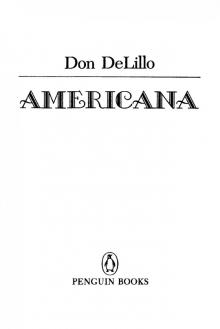 Americana
Americana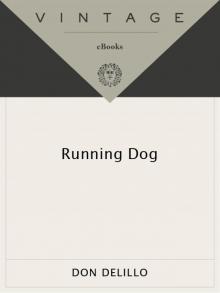 Running Dog
Running Dog Libra
Libra End Zone
End Zone Ratner's Star
Ratner's Star Underworld
Underworld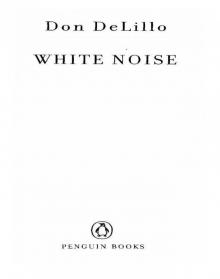 White Noise
White Noise Players
Players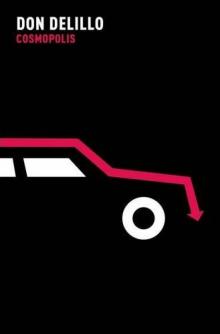 Cosmopolis
Cosmopolis The Silence
The Silence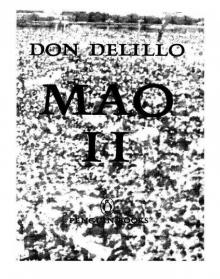 Mao II
Mao II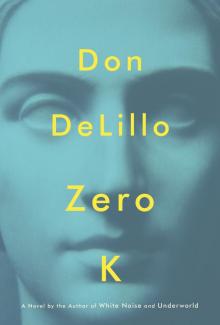 Zero K
Zero K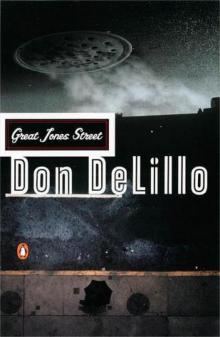 Great Jones Street
Great Jones Street The Angel Esmeralda
The Angel Esmeralda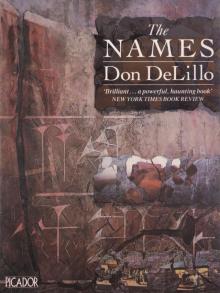 The Names
The Names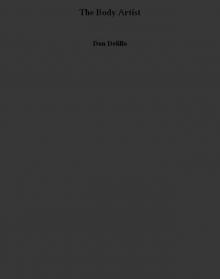 The Body Artist
The Body Artist Point Omega
Point Omega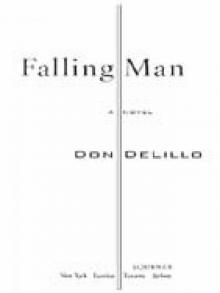 Falling Man
Falling Man